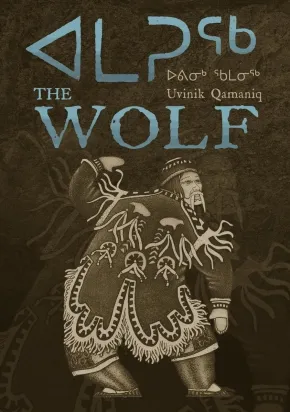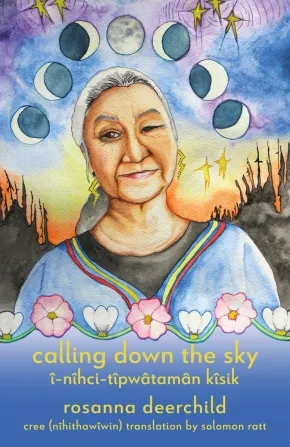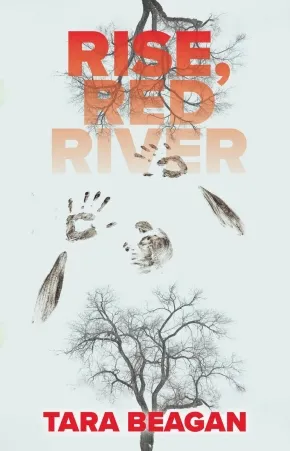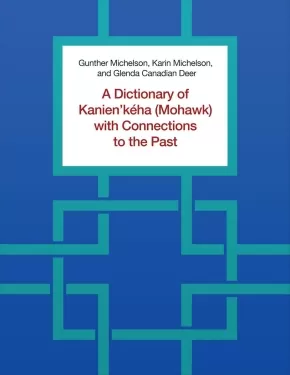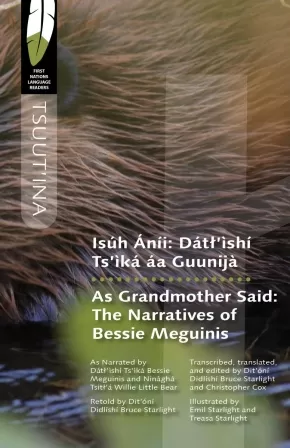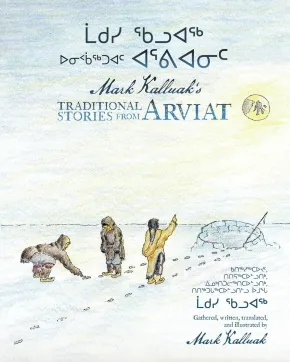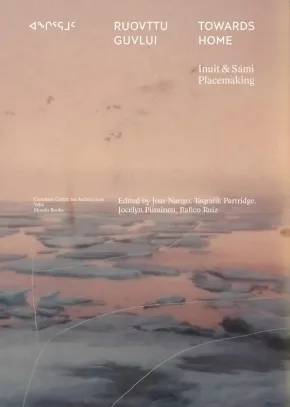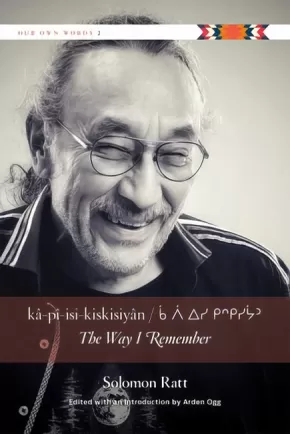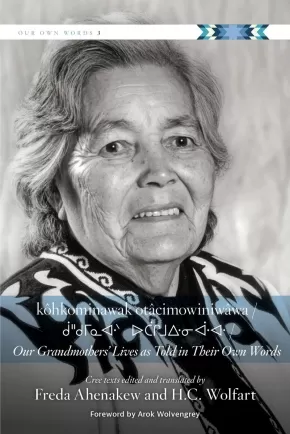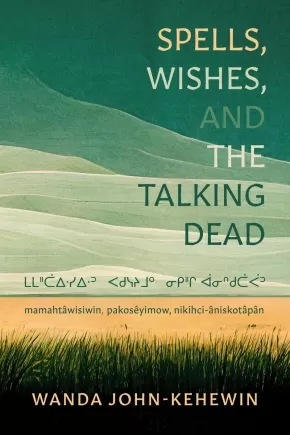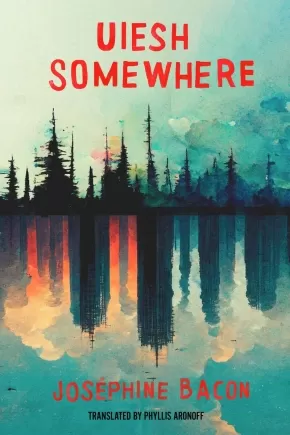
Dual or Triple Language
1
-
15
of
38 Results;
Sort By
Go To
of 3
Amaruq: The Wolf
$21.95
Format:
Paperback
Text Content Territories:
Indigenous Canadian; Inuit;
ISBN / Barcode: 9781772275674
Synopsis:
Synopsis:
Amaruq: The Wolf was one of the first full-length novels ever written in Inuktitut. Out of print for over twenty years, this groundbreaking novel has been re-transcribed, translated, and meticulously edited to produce a commercially available bilingual version for the first time.
Written by Inuit Elder Uvinik Qamaniq, this sweeping novel oscillates between time and place. Alternating between a modern Arctic community, where a teen lives with his family and navigates the challenges of family life, to the world of Inuit stories woven by the teen's grandfather, who tells the boy of the epic coming-of-age journey of Amaruq, a young shaman, this book highlights the power of stories to teach and inform everyday experiences. With a cover illustrated by renowned Inuit artist Germaine Arnattaujuq
Educator Information
Bilingual: English and Inuktitut.
Additional Information
208 pages | 7.00" x 9.00" | 11 b&w line drawings | Paperback
Calling Down the Sky: Tenth Anniversary Edition
$24.95
Text Content Territories:
Indigenous Canadian; Métis; Inuit; First Nations;
ISBN / Barcode: 9781552455159
Synopsis:
Synopsis:
A tenth anniversary bilingual edition in English and Cree of Rosanna Deerchild’s stunning collection about the intergenerational impacts of the Canadian residential school system.
you want me to
share my story
ok then
here it is
here in the unwritten
here in the broken lines
of my body that can never forget
In Calling Down the Sky, poet Rosanna Deerchild viscerally evokes her mother’s experience within the residential school system, the Canadian government’s system of violently removing Indigenous children from their homes, families, and languages in an explicit attempt to destroy Indigenous cultures and identities. With precise and intricate poetry, Deerchild weaves together the story of her mother’s childhood and Deerchild’s memories of her mother: her love of country music, her attempts to talk about what happened to her, how tightly she braided her daughter’s hair on the first day of school. In doing so, Deerchild illustrates the disruptive and devastating impacts of the residential school system on generations of families while also celebrating the life and culture of her mother and other survivors.
Published for the first time in a bilingual edition of Cree and English, in time for the tenth anniversary of the original publication, Calling Down the Sky is an intimate and gorgeously evoked reckoning with a horrifying part of North American history.
Reviews
“Rosanna Deerchild’s poems roll off the tongue as easy as old country songs. With her deft hand, Deerchild finely tunes every word and weaves them together as intimately as she braids her girls’ hair. Together, these poems create a story that sings with beautiful tension, amazing resilience, and love as big as the sky." - Katherena Vermette, Métis Writer
"The poetry collection, called calling down the sky, describes personal experiences with the residential school system in the 1950s and the generational effects it had." - CBC
"This poetry collection is fierce, raw and candid. It is also visceral, intricate and, above all, illuminating. By recounting her mother’s residential school experience in a powerfully poetic narrative, Deerchild expertly illustrates the heartbreaking trauma of that tragic saga and how it complicates relationships over generations. By beautifully and elaborately exploring those relationships and that devastating history, she finds and celebrates the resilient and hopeful spirit that many residential school survivors, like her mother, have managed to retain in the face of horror and torment. As a result, calling down the sky is an essential read in understanding the true modern history of this land and in honouring the people who survived it.” - Waubgeshig Rice
Educator Information
Bilingual: English and Cree
Additional Information
96 pages | 5.50" x 8.50"
Rise, Red River
$18.95
Format:
Paperback
Text Content Territories:
Indigenous Canadian; First Nations; Anishinaabeg;
Reading Level: N/A
ISBN / Barcode: 9780369105486
Synopsis:
Synopsis:
“The map of the land is in our blood.”
A woman trawls the bottom of a riverbed with a makeshift plough, hoping to dislodge something—anything. The world has drastically changed: rivers run dry, rampant bushfires leave little left to burn. Still she persists searching for the stories of her loved ones, maybe even her own. She is not alone—an ancestor watches nearby. This desolate landscape is about to unearth its long-held secrets.
Inspired by the grassroots organization Drag the Red, which searches for evidence of missing Indigenous women, girls, and 2 Spirit people in the Red River of Treaty One Territory, this ethereal and engrossing drama is a profound offering to those who persevere in spite of sorrow. Told in Anishinaabemowin, English, and French, Tara Beagan’s prophetic play draws a direct connection between the treatment of Indigenous peoples and the abuse inflicted on the land. Fluid and majestic like the river itself, Rise, Red River is an invocation, a revelation, and a call to action.
Educator Information
Told in Anishinaabemowin, English, and French.
Additional Information
112 pages | 5.37" x 8.38" | Paperback
Winnipeg: and Other Places
$9.95
Format:
Paperback
Reading Level: N/A
ISBN / Barcode: 9781998779604
Synopsis:
Synopsis:
Winnipeg and Other Places / Winnipeg et ailleurs is a back-to-back bilingual collection of short stories which read as sketches or snapshots of the author’s wanderings. Seen through the author’s subjective lenses, no two people have the same recollection of the past or of what just happened. Memory, loss, and longing are shaped by the author’s native Winnipeg and wherever else fate has taken him.
Educator Information
Bilingual: English and French.
Additional Information
75 pages | 3.00" x 5.00" | Paperback
A Dictionary of Kanien'kéha (Mohawk) with Connections to the Past
$70.00
Text Content Territories:
Indigenous Canadian; First Nations; Haudenosaunee (Iroquois); Kanyen'keha:ka (Mohawk);
Grade Levels: University/College;
ISBN / Barcode: 9781487548452
Synopsis:
Synopsis:
This dictionary provides a record of the Kanien’kéha (Mohawk) language as spoken by fluent first- and second-language speakers at the Kanien’kéha Mohawk Territory outside of Montreal, Canada.
The Kanien’kéha language has been written since the 1600s, and these dictionary entries include citations from published, archival, and informal writings from the seventeenth century onwards. These citations are a legacy of the substantial documents of missionary scholars and several informal vocabulary lists written by Kanien’kéha speakers, among others. The introduction to the dictionary provides a description of the organization and orthography of the historical works so that they can be used in the future by those studying and learning the language.
A Dictionary of Kanien’kéha (Mohawk) with Connections to the Past allows scholars and students to learn the meaning, composition, and etymology of words in a language known for its particularly complex word structure. The organization of the entries, according to noun and verb roots, highlights the remarkable potential and adaptability of the language to express traditional concepts, as well as innovations that have resulted from contact with other customs and languages that have become part of the contemporary culture of the Kanien’kehá:ka.
Additional Information
528 pages | 8.50" x 11.00" | 6 b&w illustrations, 18 b&w tables | Paperback
Isúh Áníi / As Grandmother Said: Dátl'ìshí Ts'ìká áa Guunijà / The Narratives of Bessie Meguinis
$24.95
Format:
Paperback
Text Content Territories:
Indigenous Canadian; First Nations; Dene; Tsuut’ina (Tsuu T'ina, Sarcee);
Grade Levels: 12; University/College;
ISBN / Barcode: 9780889779853
Synopsis:
Synopsis:
The first book published in Tsuut’ina—a critically endangered language—in over a century!
With fewer than 150 speakers, Tsuut’ina is a critically endangered language. Isúh Áníi / As Grandmother Said brings together nine traditional narratives and historical accounts in the Tsuut’ina language, originally narrated by Elders Dátł’ìshí Ts’ìká Bessie Meguinis (1883–1987) and Ninàghá Tsìtł’á Willie Little Bear (1912–1989). At once an act of language preservation and a learning resource, each story is retold in Tsuut’ina by Dit’óní Didlíshí Dr. Bruce Starlight and is presented with English translations and a Tsuut’ina-to-English glossary.
The narratives included in this collection cover considerable ground, ranging from the creation of the world in the caring hands of Xàlítsa-tsii and his animal helpers, to accounts of separation, migration, and cross-cultural contact that mark major turning points in Tsuut’ina history, and to important cultural and ceremonial items and practices that the Tsuut’ina Nation maintains to this day.
These stories will be of lasting value to Tsuut’ina language learners and teachers, and will share the legacy of Elders Bessie Meguinis and Willie Little Bear with generations of Tsuut’ina to come.
Educator & Series Information
This book is part of the First Nation Language Readers series. With a mix of traditional and new stories, each First Nations Language Reader introduces an Indigenous language and demonstrates how each language is used today.
Additional Information
186 pages | 5.50" x 8.50" | Paperback
Mark Kalluak's Traditional Stories from Arviat
$39.95
Artists:
Format:
Hardcover
Text Content Territories:
Indigenous Canadian; Inuit;
Reading Level: N/A
ISBN / Barcode: 9781772275117
Synopsis:
Synopsis:
Mark Kalluak was a respected community leader and Inuktitut specialist who was passionate about sharing Inuit culture. This book is a compilation of Kalluak’s works on traditional Inuit stories and beliefs from his home community of Arviat, Nunavut. These tales and cultural outlooks were thoughtfully collected, written in Inuktitut and English, and illustrated by Kalluak. From the origins of darkness and light, to cautionary tales of how to treat others, to explanations of taboos, this book is a noteworthy collection of traditional Inuit stories and beliefs.
Additional Information
216 pages | 8.00" x 10.00" | Hardcover
Towards Home: Inuit & Sámi Placemaking
$46.00
Editors:
Format:
Paperback
Text Content Territories:
Indigenous Canadian; Inuit; Indigenous European; Sami;
Reading Level: N/A
ISBN / Barcode: 9789493246256
Synopsis:
Synopsis:
Design and building concepts that pay respect to the land and empower Indigenous communities across the Northern Hemisphere
An Indigenous-led publication, Towards Home explores how Inuit, Sámi and other communities across the Arctic are creating self-determined spaces. This research project, led by Indigenous and settler coeditors, is titled after the phrases angirramut in Inuktitut, or ruovttu guvlui in Sámi, which can be translated as “towards home.” To move towards home is to reflect on where northern Indigenous people find home, on what their connections to their land means and on what these relationships could look like into the future. Framed by these three concepts—Home, Land and Future—the book contains essays, artworks, photographs and personal narratives that express Indigenous notions of home, land, kinship, design and memory. The project emphasizes caring for and living on the land as a way of being, and celebrates practices of space-making and place-making that empower Indigenous communities.
Educator Information
With contributions from Robyn Adams, Ella den Elzen, Liisa-Rávná Finbog, Napatsi Folger, Carola Grahn, Jenni Hakovirta, Elin Kristine Haugdal, Geronimo Inutiq, Ellen Marie Jensen, Tanya Lukin Linklater, Nicole Luke, Reanna Merasty, Johanna Minde, Joar Nango, Taqralik Partridge, Jocelyn Piirainen, Naomi Ratte, Tiffany Shaw, Sunniva Skålnes, Jen Rose Smith, and Olivia Lya Thomassie
Additional Information
352 pages | 6.75" x 9.50" | 150 Illustrations | Paperback
acâhkos nikamowini-pîkiskwêwina?: nêhiyawi-kîsik âcimowin? The Star Poems: A Cree Sky Narrative
$24.95
Format:
Paperback
Text Content Territories:
Indigenous Canadian; First Nations; Cree (Nehiyawak);
ISBN / Barcode: 9781778690174
Synopsis:
Synopsis:
Aided by Grandmother Spider, Star Woman discovers the Hole-in-the-Sky, opening a pathway for the Star People to experience the wonder of life on earth. But the world falls into the hands of the Paper People, jeopardizing the sacred harmony between nature and the cosmos. And so Little Spirit, a young boy, must search for meaning and find redemption in the care of Grandmother Moon.
An epic narrative, The Star Poems explores the black hole of colonial history—Residential Schools, the loss of the father, youth suicide—and the vital role of women in reclaiming our traditional knowledge, the teachings that stitch together the fabric of the universe.
The Star Poems creatively engages Cree oral tradition in a new way, connecting Indigenous spirituality and quantum physics to honour and adapt some of our most ancient stories about the origins of life and our place in the universe. Presented in both English and Cree, The Star Poems is a timely contribution to the revitalization of the Cree language—and the fascinating world of star stories.
Educator Information
Recommended for ages 15+
Additional Information
132 pages | 6.00" x 9.00" | Paperback
Elements
$21.95
Format:
Paperback
Text Content Territories:
Indigenous Canadian; Inuit;
Reading Level: N/A
ISBN / Barcode: 9781772274844
Synopsis:
Synopsis:
In this complex, at times dark, poetry collection from Inuk author Jamesie Fournier, readers are taken through the recesses of a character struggling with inner demons whispering into his mind.
As he attempts to overcome his inner turmoil within a Colonial and contemporary system that oppresses him, the speaker guides readers through verse both ethereal and imagistic. Echoing artists as varied as Margaret Laurence and The Velvet Underground, this sweeping collection of bilingual verse deals with erasure, resilience, and—above all—resistance through the voice of one complex protagonist.
Educator Information
Bilingual Verse in English and Inuktitut
Additional Information
132 pages | 7.00" x 9.25" | 10 b&w Photos | Paperback
kâ-pî-isi-kiskisiyân / The Way I Remember
$25.95
Format:
Paperback
Text Content Territories:
Indigenous Canadian; First Nations; Cree (Nehiyawak);
ISBN / Barcode: 9780889779143
Synopsis:
Synopsis:
A residential school survivor finds his way back to his language and culture through his family’s traditional stories.
When reflecting on forces that have shaped his life, Solomon Ratt says his education was interrupted by his schooling. Torn from his family at the age of six, Ratt was placed into the residential school system—a harsh, institutional world, operated in a language he could not yet understand, far from the love and comfort of home and family. In kâ-pî-isi-kiskisiyân / The Way I Remember, Ratt reflects on these memories and the life-long challenges he endured through his telling of âcimisowin—autobiographical stories—and also traditional tales.
Written over the course of several decades, Ratt describes his life before, during, and after residential school. In many ways, these stories reflect the experience of thousands of other Indigenous children across Canada, but Ratt’s stories also stand apart in a significant way: he managed to retain his mother language of Cree by returning home to his parents each summer despite the destruction wrought by colonialism.
Ratt then shifts from the âcimisowina (personal, autobiographical stories) to âcathôhkîwina, (sacred stories) the more formal and commonly recognized style of traditional Cree literature, to illustrate how, in a world uninterrupted by colonialism and its agenda of genocide, these traditional stories would have formed the winter curriculum of a Cree child’s education.
Presented in Cree Th-dialect Standard Roman Orthography, syllabics, and English, Ratt’s reminiscences of residential school escapades almost always end with a close call and a smile. Even when his memories are dark, Ratt’s particularly Cree sense of humour shines, making kâ-pî-isi-kiskisiyân /The Way I Remember an important and unique memoir that emphasizes and celebrates Solomon Ratt’s perseverance and life after residential school.
Reviews
"Sol is an international treasure the whole world should enjoy." —Buffy Sainte-Marie
"The Way I Remember is inarguably the most important book yet to be published for the preservation of the Cree language and an understanding of the importance of the oral tradition to Cree culture and education." —Jesse Archibald-Barber, First Nations University of Canada
"As he looks back over his life journey reclaiming, breathing new and old life back into our beautiful language, Solomon credits the late Reverend Edward Ahenekew for helping me "to put the pieces together." kista meena dear Solomon, ekosi aytotumawiyak. This is an important book because you have also put pieces together for us so that we can have a good journey. Kinahnaskomtin." —Maria Campbell, author of Halfbreed
"A gift to future generations...Full of humour and resilience in equal measure, these Cree/English stories offer us a glimpse into a world as it was, and future that could be" —Chelsea Vowel, author of Indigenous Writes
Educator & Series Information
Presented in Cree Th-dialect Standard Roman Orthography, syllabics, and English.
This book is part of the Our Own Words series.
Additional Information
264 pages | 6.00" x 9.00" | Paperback
kôhkominawak otâcimowiniwâwa / Our Grandmothers’ Lives As Told in Their Own Words
$29.95
Format:
Paperback
Text Content Territories:
Indigenous Canadian; First Nations; Cree (Nehiyawak);
Reading Level: N/A
ISBN / Barcode: 9780889779495
Synopsis:
Synopsis:
The 25th anniversary of a historically significant collection, presented in Cree and English.
kôhkominawak otâcimowiniwâwa / Our Grandmothers’ Lives is a collection of reminiscences and personal stories from the daily lives of seven Cree women over the past century, presented here in Cree and English. Recorded in their own language, these women share their memories of their lives and the history of their peoples, describing activities such as household chores, snaring rabbits and picking berries, going to school, marriage, bearing and raising children, and providing insights into the traditional teachings of a society in which the practical and spiritual are never far apart.
Reviews
"[T]hese ... are good stories to share ... and are absolute treasures." —Chelsea Vowel, author of Buffalo is the New Buffalo
Educator & Series Information
This book is part of the Our Own Words series.
Presented in Cree and English.
Additional Information
418 pages | 6.00" x 9.00" | Paperback
Spells, Wishes, and the Talking Dead: ᒪᒪᐦᑖᐃᐧᓯᐃᐧᐣ ᐸᑯᓭᔨᒧᐤ ᓂᑭᐦᒋ ᐋᓂᐢᑯᑖᐹᐣ mamahtâwisiwin, pakosêyimow, nikihci-âniskotâpân
$19.95
Format:
Paperback
Text Content Territories:
Indigenous Canadian; First Nations; Cree (Nehiyawak); Plains Cree;
Reading Level: N/A
ISBN / Barcode: 9781772015126
Synopsis:
Synopsis:
A vital collection weaving history, personal experience, and Indigenous resilience.
Spells, Wishes, and the Talking Dead: mamahtâwisiwin, pakosêyimow, nikihci-âniskotâpân is a wonder. It plays with form, space, and language, comparing meanings in English and nêhiyawêwin (Plains Cree). The reader’s attention is drawn to the restrictive and imposed constructs of English grammar, the way it boxes in interpretation and cadence.
With inspiring defiance, Wanda John-Kehewin demonstrates which magics cannot be suppressed. Broken into three sections, Spells, Wishes, and the Talking Dead looks at the sickening grip of colonialism: its ongoing detriment to the mental health of Indigenous people, its theft of language, and the scope of its intergenerational harms. The author places herself, her work, and her family’s personal experiences in the context of a historical timeline running from the so-called doctrine of discovery to the present day. Recounting the two in tandem reveals the unrelenting nature of violence and, in turn, resistance. There is great power in truth; John-Kehewin “stands in her truth” so that other survivors may stand in theirs.
Educator Information
Recommended in the Canadian Indigenous Books for Schools resource collection as being useful for grades 11 and 12 for English Language Arts, English First Peoples, Social Studies.
Content Warning: Coarse language, mature content: references to abuse, trauma, suicide.
Additional Information
96 pages | 6.00" x 9.00" | Paperback
Uiesh / Somewhere
$19.95
Format:
Paperback
Reading Level: N/A
ISBN / Barcode: 9781772015140
Synopsis:
Synopsis:
Vital bilingual poetry by Innu Elder Joséphine Bacon
Uiesh / Somewhere consists of short poems that speak directly to the reader, without artifice or pretension. They arise from Joséphine Bacon’s experience as an Innu woman, whose life has taken her from the nomadic ways of her Ancestors in the northern wilderness of Nitassinan, or Innu Territory, to the clamour and bustle of the city. Wherever she is, the poet and Elder is attentive to the smallest details of her environment … from the moon and the stars, the aurorae borealis, the falling snow, the changing seasons, to the sirens of fire engines and ambulances and the noise of a busy bar night. From her quiet centre, she listens to the voices of the Old Ones, whose stories are alive within her, and looks back at the beauty and the pain of her long life.
Additional Information
80 pages | 6.00" x 9.00" | Paperback
âhkami-nêhiyawêtân / Let’s Keep Speaking Cree
$32.95
Format:
Coil Bound
Text Content Territories:
Indigenous Canadian; First Nations; Cree (Nehiyawak);
ISBN / Barcode: 9780889778467
Synopsis:
Synopsis:
An important language resource that helps intermediate nêhiyawêtan learners begin to understand more advanced grammar of the language.
Let’s keep on speaking Cree:
In our language is our life;
Let’s keep on speaking Cree:
In our language is our identity.
Building on mâci-nêhiyawêwin / Beginning Cree, Solomon Ratt’s first influential Cree language resource, âhkami-nêhiyawêtân / Let’s Keep Speaking Cree helps intermediate nêhiyawêtan learners begin to understand more advanced grammar of the language. The textbook is more than a language textbook though: it includes a series of the author’s original stories written in Cree, complete with comprehension questions, making it ideal for self-study as well as classroom use.
Educator & Series Information
This book builds on mâci-nêhiyawêwin / Beginning Cree.
Latest Cree language workbook by highly respected author and educator Solomon Ratt, intended for intermediate readers/speakers/
learners
First title in the Continuing Language series, which will build upon our introductory Indigenous language learner texts
Includes sections on going to the doctor, Cree culture and values, protocols, faith, humility, teachings, and more.
Additional Information
304 pages | 8.50" x 11.00" | Spiral Bound
Sort By
Go To
of 3

